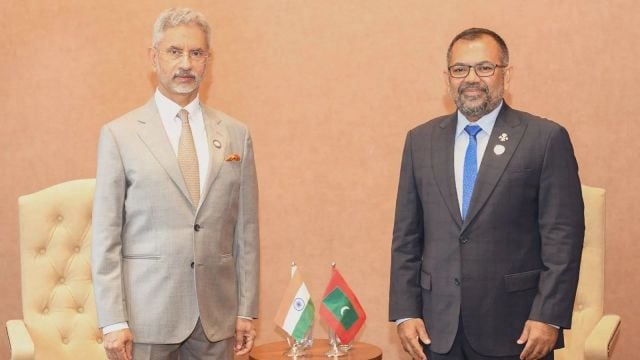 Maldives Foreign Minister Moosa Zameer with India's EAM S. Jaishankar. (File photo)
Maldives Foreign Minister Moosa Zameer with India's EAM S. Jaishankar. (File photo)Foreign Minister Moosa Zameer has acknowledged that the Maldives-India ties witnessed rough patches in the initial days of President Mohammad Muizzu-led government but insisted that the two countries have resolved the “misunderstandings”.
Zameer made the remarks on Friday during a visit to Sri Lanka, where he stressed the importance of the Indian Ocean archipelago’s relationships with key allies, particularly China and India.
He said that relations with India had faced challenges, particularly following President Muizzu’s campaign to remove a small contingent of Indian troops from the Maldives.
Zameer said that the “misunderstandings” between the two countries have been resolved following the repatriation of Indian troops from the Maldives.
“At the start of our government, we did have some rough patches (with India), you know,” Zameer has been quoted as saying by The Edition newspaper.

“(We) have good relations with both China and India, and both countries continue to support Maldives,” he said.
India’s relationship with the Maldives came under strain since Muizzu, known for his pro-China leanings, took charge as the President. Within hours of his oath, he had demanded the withdrawal of Indian military personnel manning three aviation platforms gifted by India to the Maldives. After talks between the two sides, the Indian military personnel were replaced by civilians.
Things escalated after three Maldivian deputy ministers made controversial remarks regarding India and Prime Minister Narendra Modi on social media. Maldives Foreign Ministry distanced itself from their remarks, and the three junior ministers were suspended.
Unlike his predecessors, who made the first port of call to New Delhi after assuming office, Muizzu travelled to Turkiye first and to China for his first state visit in January. He visited New Delhi on June 9 to attend Prime Minister Modi’s swearing-in ceremony.
Muizzu will travel to India on an official visit “very soon”, his spokesperson said on Tuesday.
Zameer also said that the Maldives has no plans to seek an International Monetary Fund (IMF) bailout, dismissing the current economic challenges faced by his country as “temporary.” “We have bilateral partners who are very sensitive to our needs and our situation,” he said, signalling the government’s confidence in addressing its fiscal issues without resorting to external assistance from the IMF.
“I seriously don’t think it is a time where we will be right now engaging with the IMF. The issue that we have is very temporary because currently, we are having a dip in reserves.” Zameer outlined the government’s strategy to address the economic situation, which includes implementing reforms in the tax regime and cost-cutting measures for government-owned enterprises.
He also highlighted the strengthening of bilateral relations with China and India, noting that these countries have been instrumental in supporting the Maldives.
His remarks came in the wake of warnings from credit rating agencies about the Maldives’ financial situation.
The Maldives owes much of its external debt to China and India. The government’s debt servicing commitments amount to USD 409 million this year, placing additional stress on its already limited foreign currency reserves.
Maldives reserves currently stands at USD 444 million, with usable reserves at USD 61 million, the paper said.
“The rationalisation of state-owned enterprises will certainly help us in managing our resources better,” Zameer said.
Zameer was joined by Finance Minister Mohamed Shafeeq in Sri Lanka, where the two held meetings with Sri Lankan central bankers and other officials to discuss financial matters.
 Earn Coin
Earn Coin Mining
Mining
 Play Games
Play Games




 Spin Wheel
Spin Wheel Miner
Miner Play & Win
Play & Win